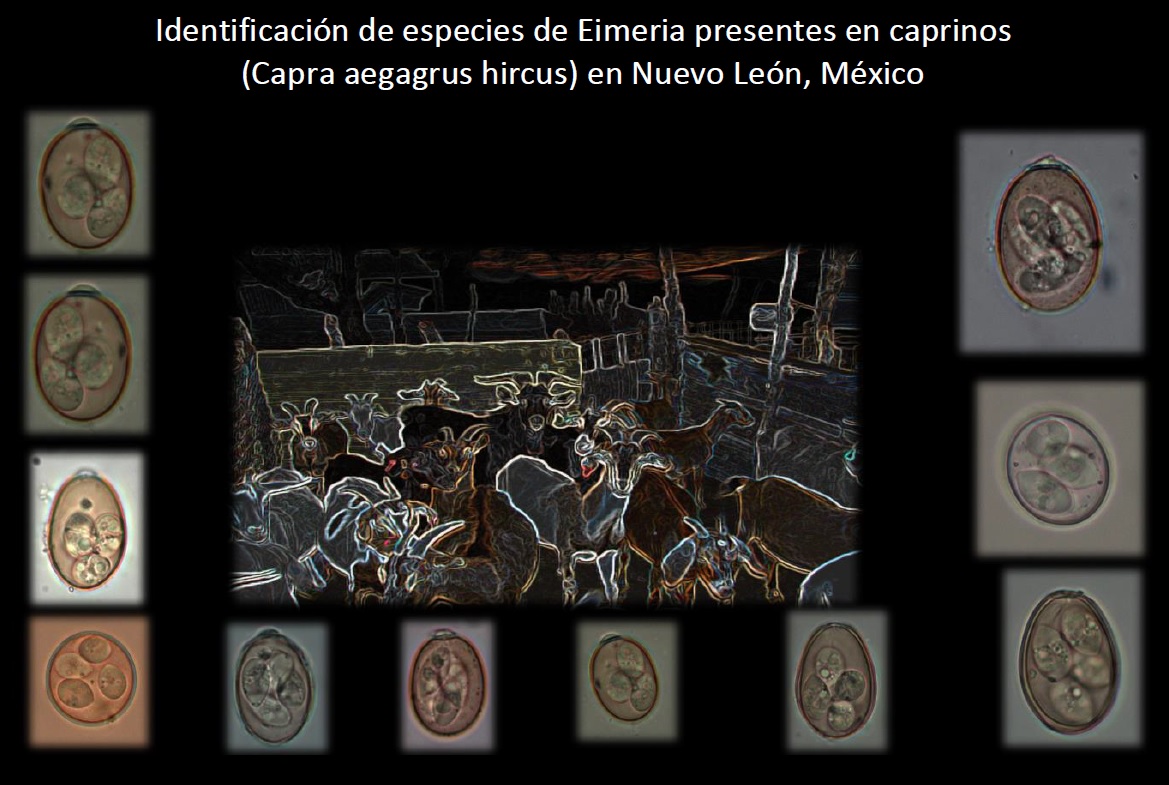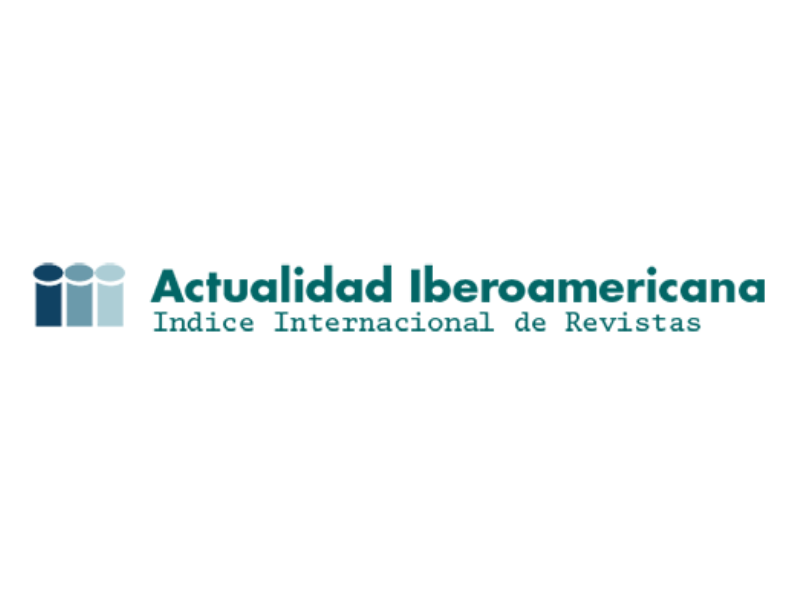Identification of Eimeria species present in goats (Capra aegagrus hircus) in Nuevo León, Mexico
Identificación de especies de Eimeria presentes en caprinos (Capra aegagrus hircus) en Nuevo León, México


This work is licensed under a Creative Commons Attribution-NonCommercial-ShareAlike 4.0 International License.
Show authors biography
Objective. To identify, describe and determine the frequency of species of the genus Eimeria from goat feces from the state of Nuevo Leon, Mexico. Materials and methods. From 403 samples of goat excreta from 13 municipalities of Nuevo Leon, Mexico. Subsequently, after sporulation of the parasite dispersal forms (Oocysts), identification was made according to their morphology and morphometry by means of histograms and linear regression analysis. Results. A total of 60.29% of the animals sampled were positive for the presence of oocysts of Eimeria spp. The municipalities in which this parasite was most frequently detected were Ramones and Pesquería with 100% of positive samples, while a lower frequency was observed in the municipality of Aramberri with 3.4%. The morphological and morphometric analysis of the sporulated oocysts allowed the identification of 8 different types of Eimeria in the group of animals studied: E. caprina, E. caprovina, E. christenseni, E. ninakohlyakimovae, E. jolchijevi, E. alijevi, E. arloingi and E. apsheronica. Conclusions. Most of the identified Eimeria spp. showed a high degree of polymorphism. According to their morphometric characteristics, eight species were identified, including E. apsheronica, which has not been previously described in Mexico. Further studies of Eimeria species circulating in goats in Mexico are required.
Article visits 607 | PDF visits
Downloads
- Zhang W, Wang R, Yang F, Zhang L, Cao J, Zhang X, et al. Distribution and genetic characterizations of Cryptosporidium spp. in pre-weaned dairy calves in Northeastern China’s Heilongjiang Province. PLoS One. 2013; 8(1):e54857.http://dx.doi.org/10.1371/journal.pone.0054857
- Daş G, Ataşoğlu C, Akbağ HI, Tölü C, Yurtman IY, Savaş T. Effects of kefir on coccidial oocysts excretion and performance of dairy goat kids following weaning. Trop Anim Health Prod. 2012; 44 (5):1049–55. http://dx.doi.org/10.1007/s11250-011-0039-3
- Khodakaram-Tafti A, Hashemnia M. An overview of intestinal coccidiosis in sheep and goats. Revue Méd Vét. 2017; 168(1/3):9-20. https://www.revmedvet.com/2017/RMV168_9_20.pdf
- Silva LMR, Carrau T, Vila-Viçosa MJM, Musella V, Rinaldi L, Failing K, et al. Analysis of potential risk factors of caprine coccidiosis. Vet Parasitol. 2020; 22(100458):100458. http://dx.doi.org/10.1016/j.vprsr.2020.100458
- Andrews AH. Some aspects of coccidiosis in sheep and goats. Small Rumin Res. 2013; 110(2–3):93–95. http://dx.doi.org/10.1016/j.smallrumres.2012.11.011
- Bangoura B, Bardsley KD. Ruminant coccidiosis. Vet Clin North Am Food Anim Pract. 2020; 36(1):187–203. http://dx.doi.org/10.1016/j.cvfa.2019.12.006
- Al-Habsi K, Yang R, Ryan U, Miller DW, Jacobson C. Morphological and molecular characterization of three Eimeria species from captured rangeland goats in Western Australia. Vet Parasitol. 2017; 9:75–83. http://dx.doi.org/10.1016/j.vprsr.2017.05.001
- Macedo LO de, Santos MAB, Silva NMM da, Barros GMM do R, Alves LC, Giannelli A, et al. Morphological and epidemiological data on Eimeria species infecting small ruminants in Brazil. Small Rumin Res. 2019; 171:37–41. http://dx.doi.org/10.1016/j.smallrumres.2018.12.006
- Alcala-Canto Y, Figueroa-Castillo JA, Ibarra-Velarde F, Vera-Montenegro Y, Cervantes-Valencia ME, Alberti-Navarro A. First database of the spatial distribution of Eimeria species of cattle, sheep and goats in Mexico. Parasitol Res. 2020; 119(3):1057–1074. http://dx.doi.org/10.1007/s00436-019-06548-8
- Statistical and Geographic Yearbook of Nuevo León.
- http://internet.contenidos.inegi.org.mx/contenidos/Productos/prod_serv/contenidos/espanol/bvinegi/productos/nueva_estruc/anuarios_2017/702825094911.pdf
- Foreyt WJ. Veterinary parasitology: reference manual. Fifth edition Iowa State University Press: United States; 2001.
- Berto BP, McIntosh D, Lopes CWG. Studies on coccidian oocysts (Apicomplexa: Eucoccidiorida). Rev Bras Parasitol Vet. 2014; 23(1):1–15. http://dx.doi.org/10.1590/s1984-29612014001
- Chartier C, Paraud C. Coccidiosis due to Eimeria in sheep and goats, a review. Small Rumin Res. 2012; 103(1):84–92. http://dx.doi.org/10.1016/j.smallrumres.2011.10.022
- Hashemnia M, Rezaei F, Chalechale A. Prevalence, intensity, and pathological lesions of Eimeria infection in goats in western Iran. Comp Clin Path. 2015; 24(4):805–810. http://dx.doi.org/10.1007/s00580-014-1986-7
- Ghimire TR, Bhattarai N. A survey of gastrointestinal parasites of goats in a goat market in Kathmandu, Nepal J Parasit Dis. 2019; 43(4):686–695. http://dx.doi.org/10.1007/s12639-019-01148-w
- Kahan TB, Greiner EC. Coccidiosis of Goats in Florida, USA. Open J Vet Med. 2013; 3(3):209–212. http://dx.doi.org/10.4236/ojvm.2013.33033
- Zhao GH, Lei L-H, Shang C-C, Gao M, Zhao YQ, Chen C-X, et al. High prevalence of Eimeria infection in dairy goats in Shaanxi province, northwestern China. Trop Anim Health Prod. 2012; 44(5):943–946. http://dx.doi.org/10.1007/s11250-011-9997-8
- Bawm S, Win TZB, Win SY, Htun LL, Nakao R, Katakura K. First detection of Eimeria species in Myanmar domestic goats with both microscopic and molecular methods. Parasite. 2020; 27:38. http://dx.doi.org/10.1051/parasite/2020037
- Sharma D, Paul S, Rout P, Mandal A, Bhusan S, Sharma N, et al. Caprine coccidiosis in semi-arid India: Dynamics and factors affecting fecal oocysts count. J Adv Vet Anim Res. 2017; 4(1):1. http://dx.doi.org/10.5455/javar.2017.d190
- Mohamaden WI, Sallam NH, Abouelhassan EM. Prevalence of Eimeria species among sheep and goats in Suez Governorate, Egypt. Int J Vet Sci Med. 2018; 6(1):65–72. http://dx.doi.org/10.1016/j.ijvsm.2018.02.004























